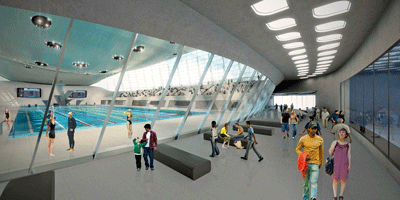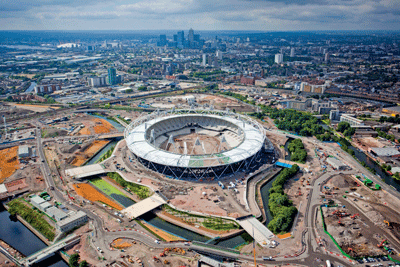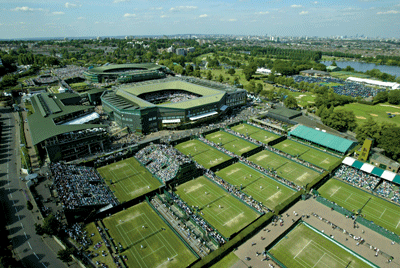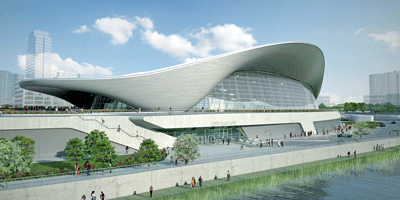If on your next visit to London you have half a day to spare, instead of taking in a museum, relaxing in one of the Royal Parks or just going shopping, you could take the underground out to Stratford, a district in northeast and part of the London Borough of Newham. It is also where the 2012 Olympics will be held.
At the weekend, there are free bus tours of the Olympics site but, assuming that it’s a weekday, a leisurely walk around Stratford would give some sense of the scale of the construction going on there and the hopes for benefits.
As with many large cities, London has its division lines – north of the river Thames and south is a notable one, but so is that between east and west.
Although property values across the UK’s capital have risen in the past two decades, the east is still a much less expensive place to live in than the west and the swathes of upmarket riverside apartments in converted warehouses along the Thames and the financial centre of Canary Wharf only highlight the divisions.
Stratford and the Lea Valley have been chosen for the Olympics not only because East London needs regeneration, but also because there was a lot of empty derelict land there. And in a city with the property prices of London, that speaks volumes. It needs something like the Olympics to kick-start this kind of rebirth.
It’s less than two years until the 2012 Summer Olympic Games, which will be held in London from July 27 to August 12, 2012. Some 200 nations will take part in some 300 events in front of a global audience of 4 billion. As with all Olympics, there is much talk of the legacy, which is really a way of justifying the astonishing cost of staging the event.
If you visit Stratford, you can see where part of the money is being spent – it is currently Europe’s biggest construction site and one of the biggest regeneration projects in British history. More than 200 buildings had to be demolished at the 2.5sqkm Olympic Park and, although certain vantage points around the site allow a view of progress, it is protective hoardings that will be your main impressions right now.
The mission is under way to involve Londoners, however, in this “spendathon”. As the two-year mark passed, a campaign was launched to find up to 70,000 volunteers or “London 2012 Games Makers” as they will be known. From doctors, anti-doping personnel and scoreboard operators to positions in ticket checking, uniform distribution and staffing helpdesks and information points – all will be volunteers. And Londoners can also volunteer to be among the 8,000 London Ambassadors, “to help the millions of visitors who will travel to London for the Games get around and enjoy a truly memorable stay in the capital”.
Involvement is vital for the Olympics to be considered a success. The Chairman of the Organising Committee (LOCOG), Lord Sebastian Coe made a direct appeal: “How will you spend the summer of 2012? Whether it’s buying a ticket, becoming a volunteer, being part of our education or culture programmes – there are hundreds of ways you can get involved. Don’t wait ... start planning your Games now.”
Meanwhile, the UK Minister for Sport and the Olympics, Hugh Robertson, pointed out at the end of July that the construction phases for the Games were “70 percent complete” and that “LOCOG has attracted an unprecedented level of commercial sponsorship”.
He said: ”The Olympic Park Legacy Company is talking to key investors about securing a future for the Park; and we are making real strides in developing a meaningful sports legacy which will be announced in the autumn.”

Visit London, the official visitor organisation, says that in the next 24 months in excess of £11 billion (US$17.44 billion) will be invested into projects directly benefiting visitors to the capital, including everything from new hotels and upgraded transport links to community projects and small business initiatives.
The major investments include the completion of the East London Line through to the redevelopment of Kings Cross St Pancras Station and even a 264-capacity “floating hotel” which will be docking in Canary Wharf.
So, will it work out? The English do a fine line in deprecation, but whereas normally there’d be a widespread certainty that things will go wrong (there’s not exactly a fine tradition of recent building projects – the British Library, the opening of Heathrow T5, the Dome) this time there is a feeling that it must succeed. As others have put it, “if Greece could do it ...”, although the observation is often backed up with, “but it bankrupted them ...”

The issue of money looms large, of course. The countdown to the Games comes as the new Conservative-Lib Dem coalition has announced £40 billion (US$63.41 billion) in government cutbacks. The Times of London has reported concerns over funding. Yet, it’s not the first time London hosted the Olympic Games – it did so in 1908 and 1948, the post-war Games now being held up as a possible model for the austerity.

The Olympics are currently on budget, despite the costs for the 80,000-seat Olympic stadium being revised from £280 million (US$444 million) to £496 million (US$786.53 million) and the 22,500-seater aquatics centre’s cost from £74 million (US$117.31 million) to £215 million (US$340.83 million). Of course, whether this is money wisely spent is another matter. As The Economist put it recently, “By combining the games with a regeneration project, Britain has added to the cost of both... Building an 80,000-seat stadium for half a billion pounds, then scaling it back after a few weeks’ use seems close to madness.”

Yet, without the Olympics it would seem doubtful that the funding would have come to Stratford at all, certainly not in today’s economic climate. Whether the Olympics are ultimately a success (creating “the legacy” that many involved speak of) is difficult to judge, even when looking back at previous incum bents. The UK Parliamentary Select Committee on Culture, Media and Sport pointed out that the Atlanta Games (1984) cost £1.5 billion (US$2.38 billion), the Barcelona Games (1992) £8.1 billion (US$12.85 billion) and Sydney 2000 about £2.5 billion (US$3.96 billion), with the final cost of the Athens Olympics (2004) being £8 billion (US$12.69 billion). London 2012’s costs will be above all of these, but then regeneration is a big part of the cost and has also attracted private investments.
The site is to be home to Stratford City, a giant 176,516sqm shopping centre by Westfield, the Australian developer. Travel across London the other way on the Central Line to Shepherd’s Bush or White City and you will see what the future holds for Stratford: a huge and extremely upmarket shopping mall with brands, in west London at least, such as Prada, Gucci and John Lewis. The plans for Stratford City were there before the Olympics were announced, but have certainly been accelerated since.
So for now, the focus is on fulfilling predictions. Olympic Delivery Authority Chairman John Armitt said: “With two years to go the venues and infrastructure needed for the Games and in legacy are on schedule and within budget. The venues will be ready next summer – a year ahead of the Games – to allow time for test events.”
Beyond that, revenues from tourists attracted by the 2012 Olympic and Paralympic Games are forecast to add up to an additional £2.1 billion (US$3.33 billion; London Councils 2012 Team, made up of representatives from the five host London boroughs); 5,000 new homes are to be built (London 2012) and a total of £10 billion (US$15.86 billion) in revenue is expected for the British economy as a whole (Lloyds TSB). For London, the success of the Olympics will not only be measured in the arenas but throughout the country as a whole.
Business is Good
Commercial sponsors
LOCOG’s commercial programme has progressed over the past 12 months, with 34 commercial sponsors now on board, raising over £650 million (US$1.013 billion) and 36 licensees who will be manufacturing and selling over 10,000 individual pieces of London 2012 merchandise.
As it heads towards its £2 billion (US$3.12 billion) budget for staging the Olympic and Paralympic Games, LOCOG has seven domestic Tier One Partners, with adidas, BMW, BP, British Telecom, EDF Energy and Lloyds TSB being among them. There are seven domestic Tier Two Supporters – Adecco, ArcelorMittal, Cadbury, Cisco, Deloitte, Thomas Cook and UPS. There are 19 domestic Tier Three Suppliers and Providers – Airwave, Atkins, Boston Consulting Group, CBS Outdoor, Crystal CG, Eurostar, Freshfields Bruckhaus Deringer LLP, GSK, Gymnova, Holiday Inn, John Lewis, McCann Worldgroup, Mondo, Next, The Nielsen Company, Populous, Technogym, Ticketmaster and Trident.
There is one domestic Tier One Paralympic Games Partner, which is Sainsbury’s.
The Worldwide Olympic Partners signed up for London 2012 are Coca-Cola, Acer, Atos Origin, GE, McDonald’s, Omega, Panasonic, Samsung and Visa.
Transport
London visitors can expect to benefit from over £11 billion (US$17.15 billion) of investment ahead of the 2012 Games, especially in terms of transport. Southeastern runs train services into London from Kent and East Sussex, operating some 2,000 trains a day, carrying more than 400,000 passengers a day, serving 179 stations and covering 869 km of railway infrastructure.
In 2012, the high-speed Javelin Train will begin operation and serve potentially 800,000 Olympic spectators per day, transporting them to Stratford International in only seven minutes.
QUICK FACTS
Scale of the Olympic Games
26 Olympic sports in 34 venues 20 Paralympic sports in 21 venues 10,500 Olympic athletes and 4,200 20,000 press and media More than 9 million tickets
The Main Venues
The Olympic Stadium www.london2012.com/venues/olympic-stadium.phpAquatics Centre www.london2012.com/venues/aquatics-venue.php
Velodrome www.london2012.com/venues/velopark.php
Hockey www.london2012.com/venues/hockey-centre.php
Handball www.london2012.com/venues/handball-arena.php
Basketball www.london2012.com/venues/basketball-arena.php
Football (Wembley Stadium) www.london2012.com/games/venues/wembley-stadium.php
Tennis (Wimbledon) www.london2012.com/games/venues/wimbledon.php
Archery (Lord’s Cricket Ground) www.london2012.com/games/venues/lord-s-cricket-ground.php
Beach volleyball (Horse Guards Parade) www.london2012.com/games/venues/horse-guards-parade.php
WebsitesOlympic Delivery Authority www.london2012.com/get-involved/work-for-2012/index.php
Department for Culture, Media and Sport www.culture.gov.uk
London 2012 www.london2012.com
London Councils www.londoncouncils.gov.uk/index.asp
Olympic Movement www.olympic.org/uk/games/index_uk.asp









